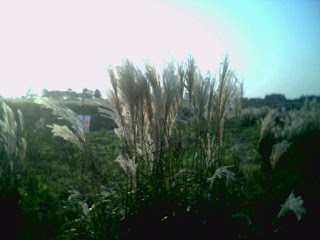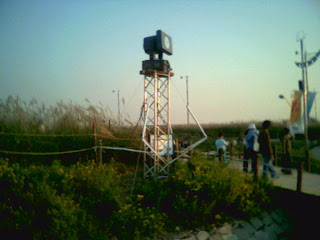so here's the thing.
In the effort of giving one's all, of being actually In The Moment, appreciating The Here And Now, there are pitfalls.
I've recently had trouble with the old cliche that you ought to live each day as if it were your last, because that's a non-viable lifestyle. If I woke up this morning and Gabrielle the messenger angel visited me in the shower and told me that, beyond a shadow of a doubt, I'd be dead by midnight that day, I'd make a certain set of choices:
What would you do?
I'd find a way to be with as many of the ones I love as possible; I'd eat the best food I knew; I'd write a letter or phone the people I could not have around me; if I were in Korea, I might try to cheat time by flying to Vancouver, crossing the international date line, and stealing an extra sixteen or seventeen hours. I'd do my damndest to die happy, whatever that means.
The thing is, I can't live each day as if it were my last. That's a pretty manic kind of day, jettisoning all responsibilities, etc.. I'd get fired after two days of living each day as if it were my last. You see the problem.
That silly old adage, I suppose, is actually intended to encourage people to live without fear, and maybe also, to live with an integrity such that, if one DID die suddenly, one could stand before God and say one has no regrets, if nothing else.
One part of that, I think, is living in the moment: being mindful of the world around, of the wonders visible all around creation, to be fully Present for the experience of being alive. That requires its own kind of courage -- to know, and then live according to, one's priorities, rather than other's perceptions, measurements, or expectations, is important to actually finding joy.
I think there are many ways we get trapped out of really Being Present, but recently I've been thinking about two in particular: veering and grasping.
I said to Girlfriendoseyo once, "There are some things that can't be fully experienced if you hesitate." This is especially true of relationships, I think. If my default approach is caution, if I'm hedging my bets before I know anything, I might shut myself off from something real, because I wanted to stay safe. My old roommate Anthony taught me the word velleity -- it means "the lowest level of motivation" -- that vague hankering one never gets around to acting upon. "I should work out more." "It was a long time ago, but I ought to apologize, really." Often the old objection, "sounds too much like work" prevents us from really investing and getting passionate about something. Sometimes, we're just afraid of what it might demand of us if we really pour ourselves into something.
A sports writer I like (Bill Simmons) discussed this in a column once as it applies to sports: some athletes DON'T prepare the best they can for their sport, so that they have an excuse ready if they fail -- if Quarterback A loses the big game, he thinks "I'll work out this off-season, instead of just drinking beer and driving my motorcycle" -- his excuse is ready-made because of his own lack of effort. He let himself down, but he can boast that "I could have won the game if I wanted". If Quarterback B loses the big game, he has nothing to fall back on -- "I trained and prepared, brought myself to the absolute peak of my ability physically and mentally. . . and I STILL failed." That's a much lonelier failure, because there's nowhere to hide. Some people do the same with relationships -- "I've been hurt before, so I'll hold back on this new one, so that I'm limiting how much she could hurt me, if it doesn't work out" -- but holding onto that old baggage might keep me from reaching the peak of the mountain! Maybe the loss hurts more if one's fully invested, but I'd much rather have a "gave it my best and it didn't work out" in my past than a "woulda coulda shoulda" -- I think the regret of woulda coulda shoulda's linger longer.
On the other hand, I realized another way people shut themselves out of truly experiencing a moment last Saturday: Girlfriendoseyo and I walked out to the middle of Mapo bridge on the Han River in Seoul, because over by 63 Building (the tallest building in Korea), there was a fireworks festival. I opened my eyes wide and watched, taking in as much as I could, from the delay between flash and boom, because of the distance, to the jostling of crowds, to the whistling of traffic conductors keeping people off the lanes still open to traffic. A large (huge) number of others, instead of watching the fireworks, held their cameras up in the air, pointed them at the fireworks, clicked, and checked in the display screen for what they had. Instead of enjoying the moment, they removed themselves a step from the actual experience, by filtering it through a camera. Taking a picture of something as ephemeral as fireworks strikes me as completely defeating the purpose of going to a fireworks show, unless you're a pyrotechnician yourself, collecting data on your rivals.
They may as well have stayed home and watched them on TV, or downloaded clips of fireworks displays from the internet! Why go in person if you're not going to BE there? (Yes, that's Be with a capital B.) Some moments are like water -- they're meant to run through your fingers and be gone, and if you catch water in a bowl, it loses a lot of the beauty it had when it was in motion, jumping over rocks and scattering light in every direction.
Camera culture is strange to me -- cameras only catch one of the five senses, and give no sense of story, and to me, if it's not a story, it's not a memory. My best memories from Malaysia are tastes, running jokes, textures of food or sand, sounds and voices. Ditto for my trips to Japan. You can't take a picture of washing all that sand down the shower drain after spending a day at the beach; you could, but it wouldn't show that little bit of sand that ALWAYS goes in the wrong direction. Even the dancers I saw in Osaka, if I took a picture of them, would have lost the excitement and motion that imprinted them on my memory. Cameras can't catch any of that, so I always feel that pictures are terribly inadequate keepsakes of a place, unless they bring about the memory of a story.
The main thing is just this: a camera removes me from the Here And Now by one step -- I'm now seeing the world through a viewfinder instead of through my eyes -- and looking at the picture is poorer again than the viewfinder display. Even more, the taking of a picture is an attempt to make permanent moments that are often best appreciated for their very fleeting nature, and stepping back from those times of spontaneous fun often kills the spirit of fun anyway.
I feel like I cheat myself out of truly experiencing life if I hesitate and guard myself, and I also limit myself by trying to keep moments that are meant to pass by. (Veering away, or grasping too tight.) Some rare pictures catch something more than just the images -- an expression, a sense of love between two people, or a sense of fun, and some people are really good at catching that (I'm thinking of my brother-in-law's pictures from my father's wedding), but for me, I'd rather open my eyes as wide as possible, turn on my senses, and experience things, as fully as I can.
And later, I can write about it.
One nice thing about cameras, and their attempt to catch things (though it removes me a little from my Here And Now) is that, though it doesn't bring back the smells and sounds for me, it DOES allow me to share my life with people who couldn't be there with me.
(Irony alert)
Here are some pictures I took from a Eulalia festival in Seoul, in Sky Park near World Cup Stadium in Seoul, where I went with Girlfriendoseyo, complained about people who hide from reality behind cameras, and then took about a dozen pictures, hypocrite that I am.
But I did it for YOU, my wonderful readers. I hope you like them.
They look like wheat, but they're about six feet tall.


The reason there's a whole park full of them is because when the sun is low in the sky, they blaze with pure white, catching the sunlight like a spider-web.


In full blossom, from close up.
I have no idea of the purpose of these plants, but they're sure pretty.

In the low sun:

They looked much nicer in person (back to that old "why bother to capture it" thing)

The one drawback: you can never quite pretend you're in the countryside when there are so many people,
when there are mounted lights (for the open-air concert to start later, and to light up the plants in the evening)

And when speakers ALL through the park are playing the Korean pop-song equivalent to Roy Orbison.


No comments:
Post a Comment